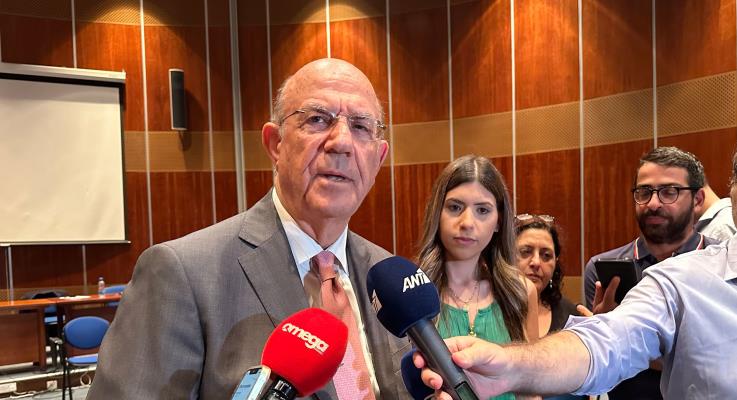Finance Minister Makis Keravnos on Monday seemed to throw another spanner in the works, saying that “no one knows” just how much the Great Sea Interconnector (GSI) project will ultimately cost.
Speaking on CyBC radio, Keravnos said he remains “preoccupied” with two major issues relating to the proposed subsea cable: no one knows how much the project will cost electricity consumers, nor when the project will become operational, translating into lower electricity prices for the public in Cyprus.
According to the minister, only estimates exist about the final cost of the GSI – some speak of €2 billion, others €2.5 billion, and others still say €3 billion.
Another issue of concern, he said, is the absence of a firm and binding timetable for the completion of the project. Here, Keravnos may have been alluding to the geopolitical factor – namely delays in laying the cable because of Turkish interference. Nevertheless, he did not explicitly refer to depth soundings in international waters, which Turkey is obstructing.
Keravnos stated that, as finance minister, he has the duty to ask for documentation about the viability of the project, and also about the €125 million that Cyprus is being asked to pay toward the GSI up until 2030.
“I get asked about these issues, and whenever I give an answer, reactions follow,” he commented.
The minister said also that given problems with other major energy projects – such as the stalled LNG terminal at Vasiliko – the government has to be extra careful when it comes to energy infrastructures.
Regarding the minister’s lukewarm or cautious stance on the GSI, daily Politis reported that in fact his position is shared by President Nikos Christodoulides and the rest of the cabinet. However, noted the paper, whereas Keravnos handles the matter in a technocratic way, the president has to deal with the diplomatic facet – namely keeping relations with Greece on an even keel.
The Greek state holds a 51 per cent stake in Admie, the project promoter for the GSI. Admie is Greece’s independent power transmission operator.
The newspaper pointed out that, without Keravnos’ say-so, no funds will be disbursed toward the interconnector project.
Under article 167 of the constitution, no payment is made unless it’s included in the state budget. But even if an item is included in the budget, actual disbursement of the funds requires formal approval from the finance ministry, which then directs the state treasury to release the funds.
In this case, said Politis, the €25 million payment to Admie for this year has been logged in the state budget. But the amount remains ‘frozen’.
In earlier remarks to the media, Keravnos was asked why the amount was included in the budget if, as he claims, the GSI project has not been confirmed as financially viable. He replied that the €25 million for 2025 was allocated based on the prior composition of the Cyprus energy regulatory authority (Cera) and a memorandum of understanding between Cyprus and Greece.
But that memorandum, Keravnos said, features “many terms and conditions”. So logging the €25 million in the budget had been more of a move to harmonise with existing decisions, rather than a commitment for immediate disbursement.






Click here to change your cookie preferences